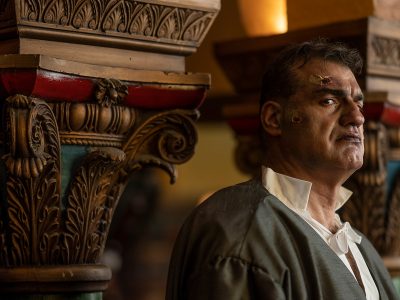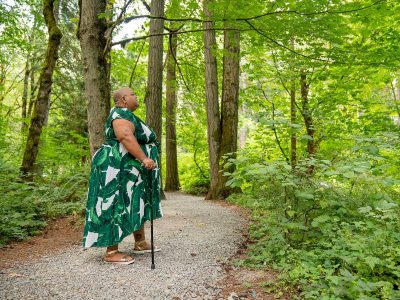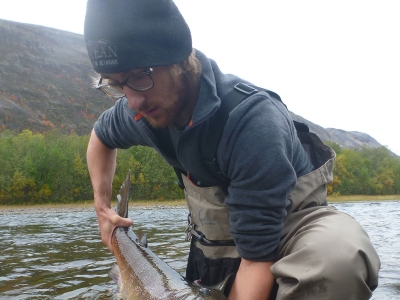By Dan Rubinstein
Photos by Chris Roussakis
Carleton student Cole Miller was home for the Christmas holidays, watching a hockey game on TV with mom and dad, when his phone buzzed. He skimmed the email from the Liquor Control Board of Ontario. One phrase stood out: We like the taste of your whisky.
“I started running around and screaming,” says Miller, who received the news that he had been waiting nearly a year to hear — provincial liquor stores will start moving toward selling the new line of whisky that his company makes.
“My parents were excited and relieved. They’ve put a lot of work into this too — and now they see that I’m not just a guy who likes to drink whisky.”
Miller, a fourth-year cognitive science student minoring in entrepreneurship, is the founder of Twelve Barrels, a startup based in the Accelerator space at Carleton’s St. Patrick’s Building.
But the whisky business, and the 21-year-old’s first foray into making alcoholic beverages, have deep roots in his hometown of Napanee, Ont., on Lake Ontario just west of Kingston.
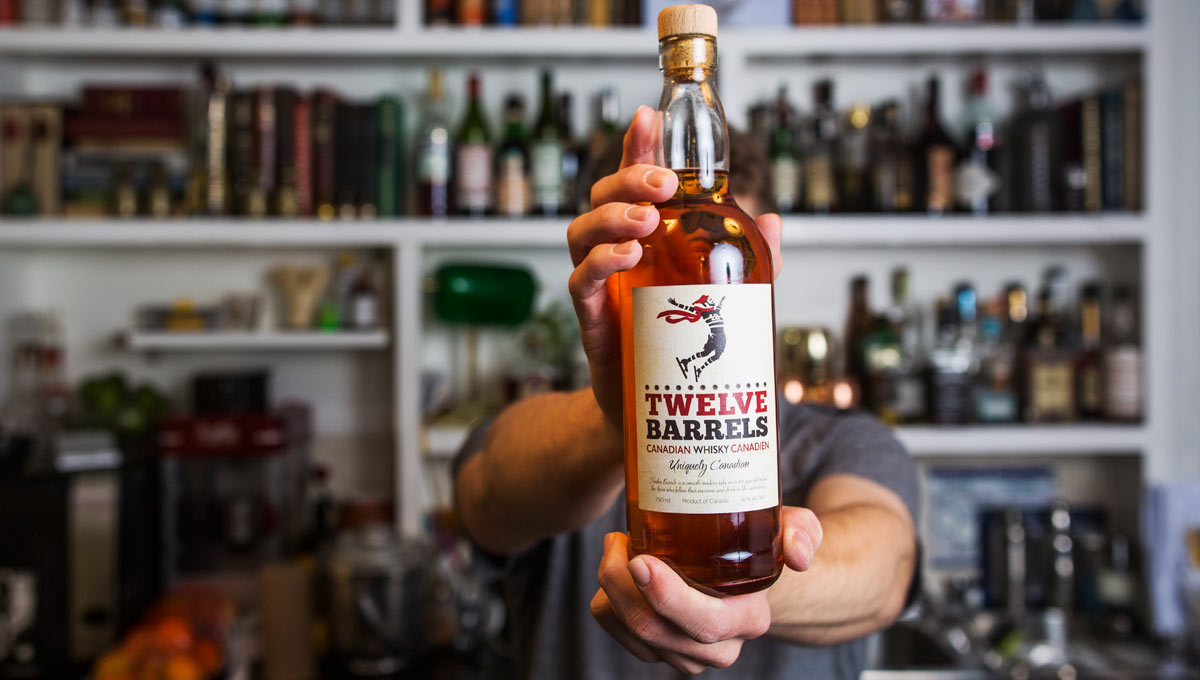
Deep Roots in Napanee
On the banks of the Napanee River in the 1850s, John Meagher opened a distillery to make whisky from surplus wheat crops, with rye grains added to the mix for flavour.
John’s son George became a world champion figure skater. He would borrow dad’s whisky barrels to practice jumping, including his signature move: a leap over a dozen barrels on the frozen river. (George also is credited with introducing hockey to Europe in the late 1800s.)
Miller’s company taps into this legacy. His product is loosely based on John Meagher’s original recipe. It’s a blend comprised predominantly of Canadian whisky, with a dash of American rye whisky that’s been aged in new barrels, both purchased from larger operations, and hand bottled at 66 Gilead, a craft distillery in the village of Bloomfield, about 50 kilometres southwest of Napanee.
Twelve Barrels’ unique blend has the easy drinking taste of a lot of Canadian whisky, with a touch of the rye spice currently sweeping the whisky market. At $35 for 750 millilitres, with a smooth finish representative of George Meagher’s smooth landings, its taste and price point are intended to appeal to consumers who are 25 to 35 years old.
Miller’s entrepreneurial energy has been focused on younger drinkers since high school, when he noticed that 19-year-olds would charge $20 to visit the liquor store for his underage classmates.
He began stealing his mom’s car, buying two-litre jugs of grape juice, sugar and baker’s yeast, and making “prison sludge” wine on the ping pong table in his basement. Stashed under his bed after three to five days, it would ferment to an alcohol content of 17 percent.
“My friends didn’t pay me for it,” says Miller. “Let’s call it a ‘donation.’”
Miller got away with this scheme for eight months, until his mom came home from work early one afternoon and he had to put the caps on his wine jugs before the carbon dioxide had time to vent. A series of explosions as the family ate dinner — and the resulting mess in his room — was the end of his venture.
“My friends liked the fact that it was moonshine,” recalls Miller. “Early on, I saw the marketing power of a good story.”
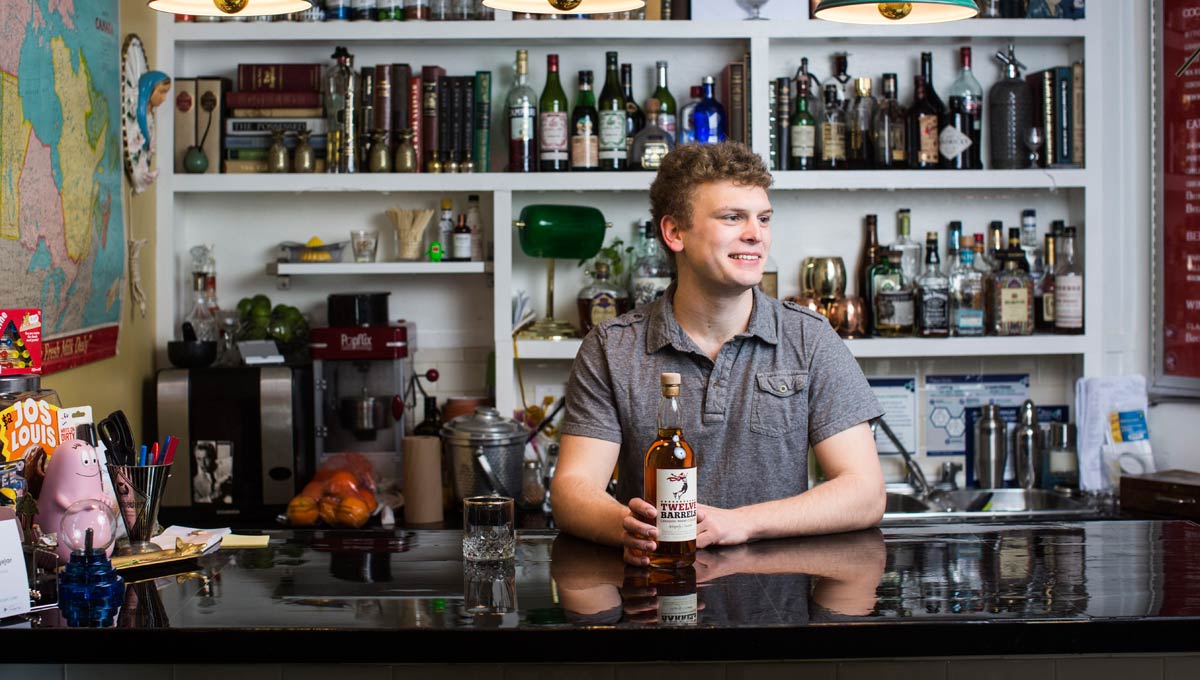
The power of a good story
At Carleton, living off campus, Miller started making beer and bought a still to make whisky — for friends and parties, not for selling. He started experimenting with different types of oak chips to flavour his whisky, toasting them on his barbeque to tinker with the taste.
“It was the next thing to do,” he says. “Making wine and beer was too easy. With whisky, there’s more creativity. It’s the epitome of alcohol aging, a challenge, a puzzle. I spent two or three hours a day, every day, for months, trying to get the recipe right.”
Craft beer may be booming these days, but Miller says that the sales proposition for most startup breweries is “we’re local, we’re new.” The same pie — about 12 to 15 per cent of the Ontario beer market — keeps getting divided into smaller and smaller pieces.
The craft spirits market, meanwhile, is projected to grow for the foreseeable future. It’s tiny right now, less than one percent of the Ontario market, but growing quickly thanks to the artisanal cocktail trend.
Miller finds his cognitive sciences courses “super interesting” — they’ve helped him understand the mindset of potential customers, and he’s written papers on topics such as the science of the hangover and how experience impacts the perception of whisky. But it has been his entrepreneurship classes, and his membership in Carleton’s Lead to Win (LTW) business incubator, that helped make Twelve Barrels Whisky a reality.
Miller has known for a long time that he wanted to launch a company — he has bought and sold stocks for years, manufactured and sold a few decorative benches, and used to buy things at garage sales and flip them on Kijiji.
Although LTW is generally focused on tech startups, it provided him with a network of experienced contacts to discuss ideas, as well as access to invaluable market research, such as state-by-state analysis of the American whisky market.
Guidance from people like LTW Executive Director Tony Bailetti helped him develop business, marketing and distribution plans. The program also encouraged him to grow quickly by going global, and connected him to the Canadian Trade Commissioner service for China — an international market that he’s actively pursuing.
“Cole has all the attributes of a successful entrepreneur,” says Bailetti, “and the distinctiveness of his opportunity is his ability to go global quickly. Whisky is his milieu — he’s been doing this since he was a kid.”
Twelve Barrels Whisky has taken a smart approach to creating value for distributors, says Bailetti. By maintaining inventory for immediate delivery, the company reduces risk for distributors; when early sales validate the product, it will be poised to expand.
“Cole understands relationship building and actively addresses the needs of the distribution channel,” says Bailetti. “He will graduate with a Carleton degree in one hand and, in the other, an operating business on its way to generating an annual revenue of $1 million by 2019.”
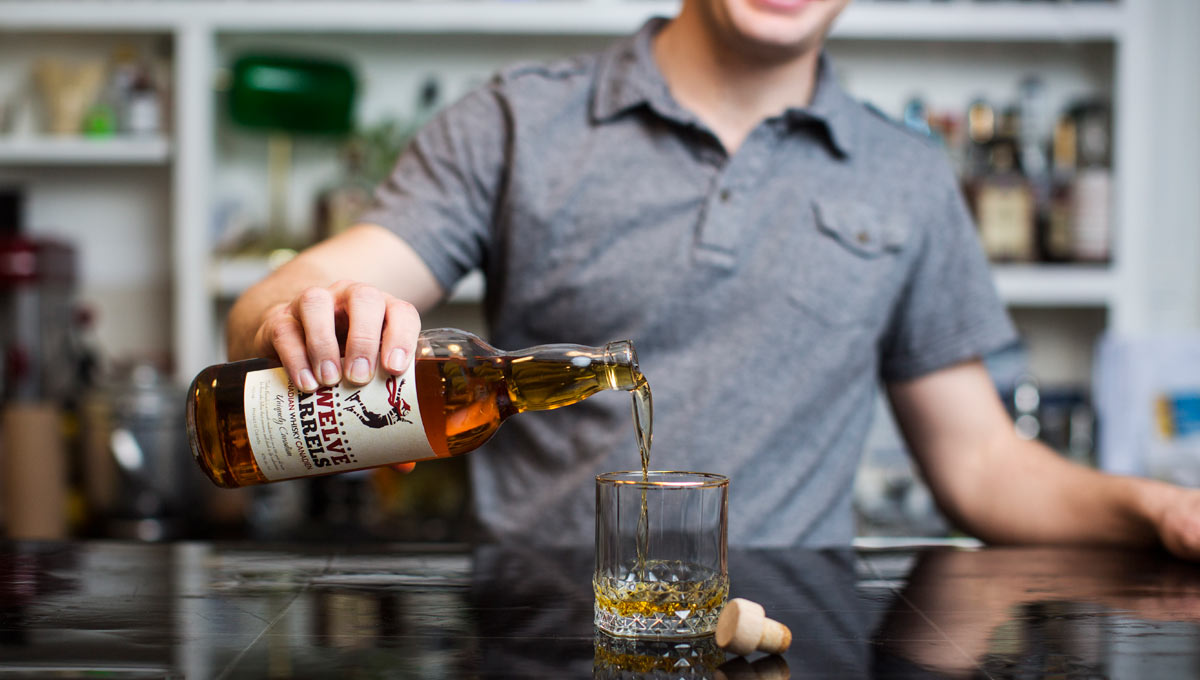
Lead to Win provided Twelve Barrels Whisky with seed funding
LTW also provided Miller with crucial seed funding, some of it through Carleton’s Nicol Internship program. And it helped him secure support such as a $37,500 Ontario Centres of Excellence SmartStart grant, and another $5,000 from the Ontario Global Edge Program, which sends recipients overseas to gain entrepreneurial experience.
Miller applied for positions at 300 distilleries and breweries and was only accepted by two, so in the summer of 2015 he went to work at the Lakes Distillery, a brand-new operation in a national park in England’s beautiful Cumbria region established by Paul Currie, who had previously co-founded the award-winning Isle of Arran Distillery in Scotland.
For four months, Miller lived in the old farmhouse on the distillery property that served as the main office. He worked on both the production and business side of the operation, getting behind-the-scenes insight from Currie on what it takes to run a spirits company.
“Cole’s passion for all things distilling shone through,” says Currie, Lakes Distillery’s managing director, “and it is clear he was destined to go into the spirits industry. We produce malt whisky, gin and vodka, so Cole was able to gain experience in the distilling of all these spirits. I am sure his time with us will stand him in good stead for his new venture.”
Upon returning to Canada, Miller acted as the Lakes Distillery’s official agent, connecting the company to the LCBO — and enhancing his own connections to the provincial liquor agency. That only intensified his interest in starting his own business.
While overseas, he had seen how it takes at least three years to age whisky; he didn’t want to wait that long. So he came up with a plan to purchase, blend and brand a whisky for a younger demographic. It wouldn’t be Canadian Club or Crown Royal — “it’s not your father’s whisky,” he quips — but something for “engaged newcomers, young professionals who socialize with alcohol but are new to whisky.”
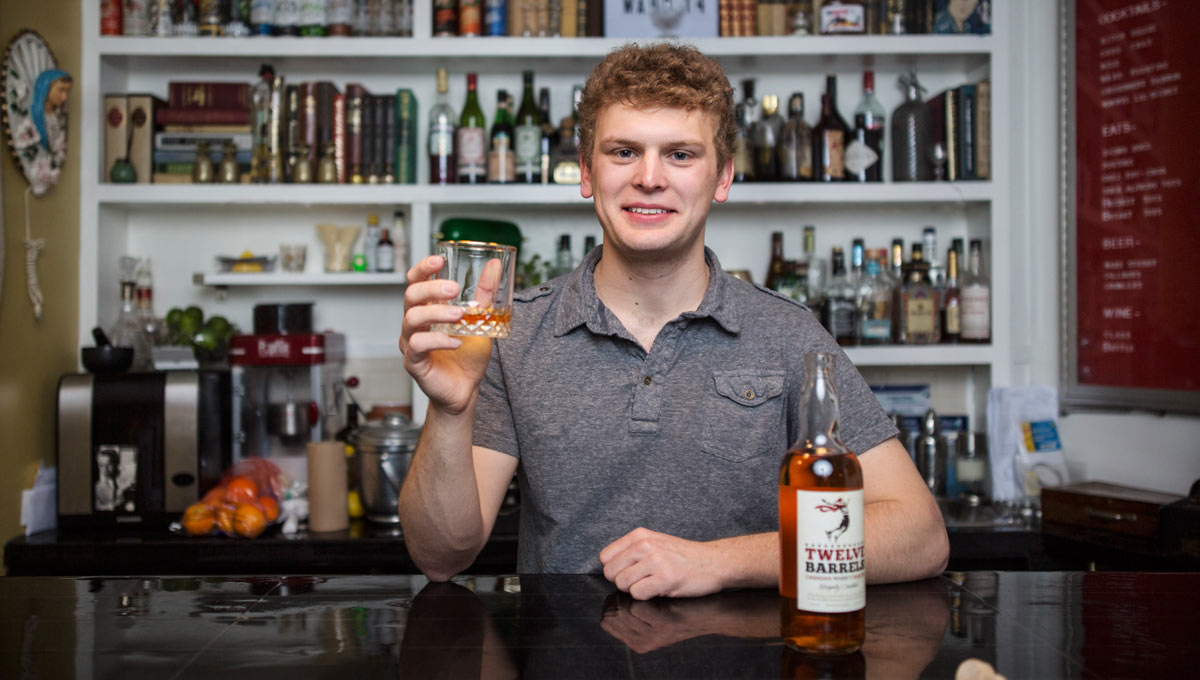
A whisky for engaged newcomers
In February 2016, Miller visited the Napanee archives. He had heard of the town’s original distillery and the story of John and George Meagher, and liked the idea of a historical image for his product.
“The branding and marketing are so important,” says Miller, “if this is to turn into something long-term and sustainable.”
Availability on LCBO shelves will be a big step in that direction. If the paperwork and due diligence stage goes smoothly, by late February or early March, Twelve Barrels Whisky could be carried by 25 stores in the Ottawa and Greater Toronto areas for a six-month trial period. Most outlets would start with 24 bottles, although the one in Napanee would take many more.
Once it has been launched, Miller hopes to expand to 100 locations by talking to and doing tastings with individual LCBO store managers and staff. He has already met with more than two dozen managers, sharing samples of the whisky as his recipe evolved into its current form. Their responses were overwhelmingly positive.
As Canadian whisky expert Davin de Kergommeaux writes in a four-star review on his website, canadianwhisky.org: “Strong caramel notes on the first nose develop hints of sweet citrus peel. The palate shows vanilla, butterscotch, peppery rye and a lovely pithiness like grapefruit peel. It stays warm, but not hot on the tongue. Twelve Barrels Whisky is a pleasing session sipper and mixes well with ginger ale and with Coke. Not overly complex but with enough going on to make it enjoyable neat. Ends with a refreshing peppery, bitterness.”
“I think Cole has really done his research well,” adds de Kergommeaux, author of the award-winning Canadian Whisky: The Portable Expert. “Making whisky is not an easy task and the smart guys hire professionals to get them started. This is a really intelligent way to launch a new whisky.”
LCBO approval will not only get sales started for Miller, it could also help him with government liquor stores in other provinces. “It validates the company,” he says, “from a credibility perspective.”
Miller is pursuing the British Columbia market, as well as the private liquor store market in Alberta. He has continued to push for a distribution deal for 40 to 50 stores in Shenzhen, China, and is currently looking into pricing, shipping and customs. And he is exploring opportunities in Texas, the biggest American consumer of Canadian whisky.
Because he won’t make a lot of money per bottle, Miller knows profit will come through “scaleability” and is eyeing a target of supplying eight provinces and 20 states. “We won’t sell a million bottles like Crown Royal,” he says, “but we can grow faster than them.”
For now, Miller has ordered enough whisky for 5,000 bottles, and he’s been waiting for a spike in interest after a segment featuring Twelve Barrels Whisky airs on CBC TV’s “Dragons’ Den” on Feb. 1.
His marks at Carleton have slipped as he spends about 80 hours a week working on his business, but after graduation it will become his full-time job — another thing that makes mom and dad proud.
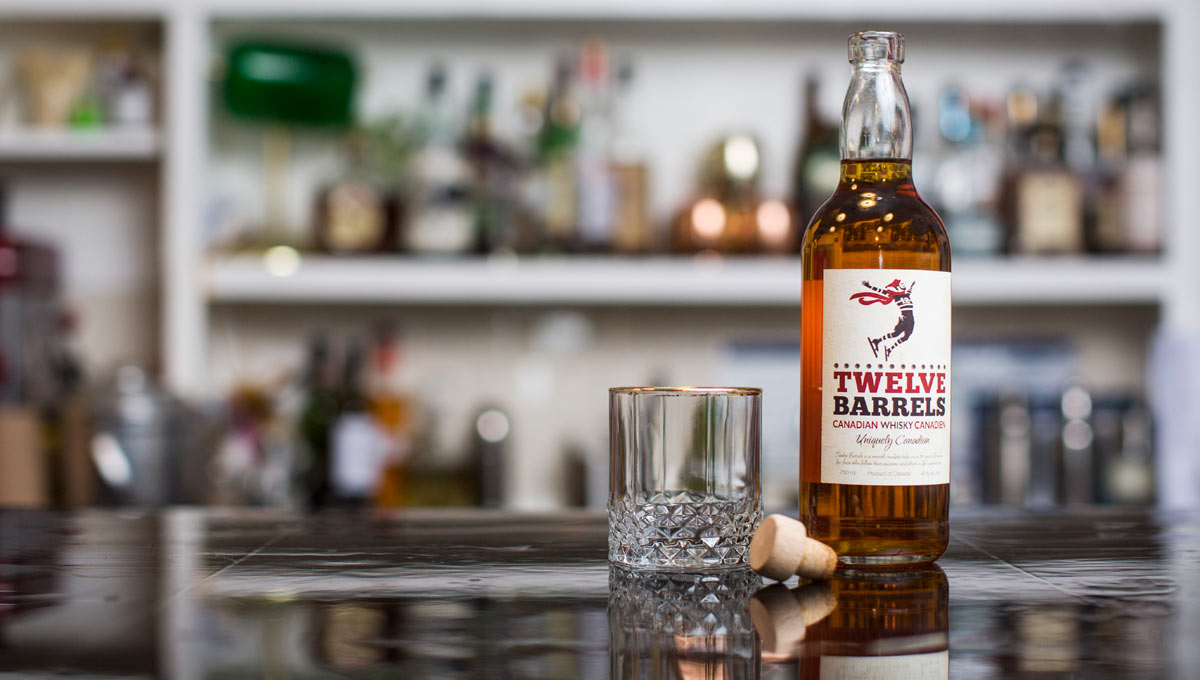
Monday, January 30, 2017 in Entrepreneurship, Faculty of Science, Student Experience
Share: Twitter, Facebook
